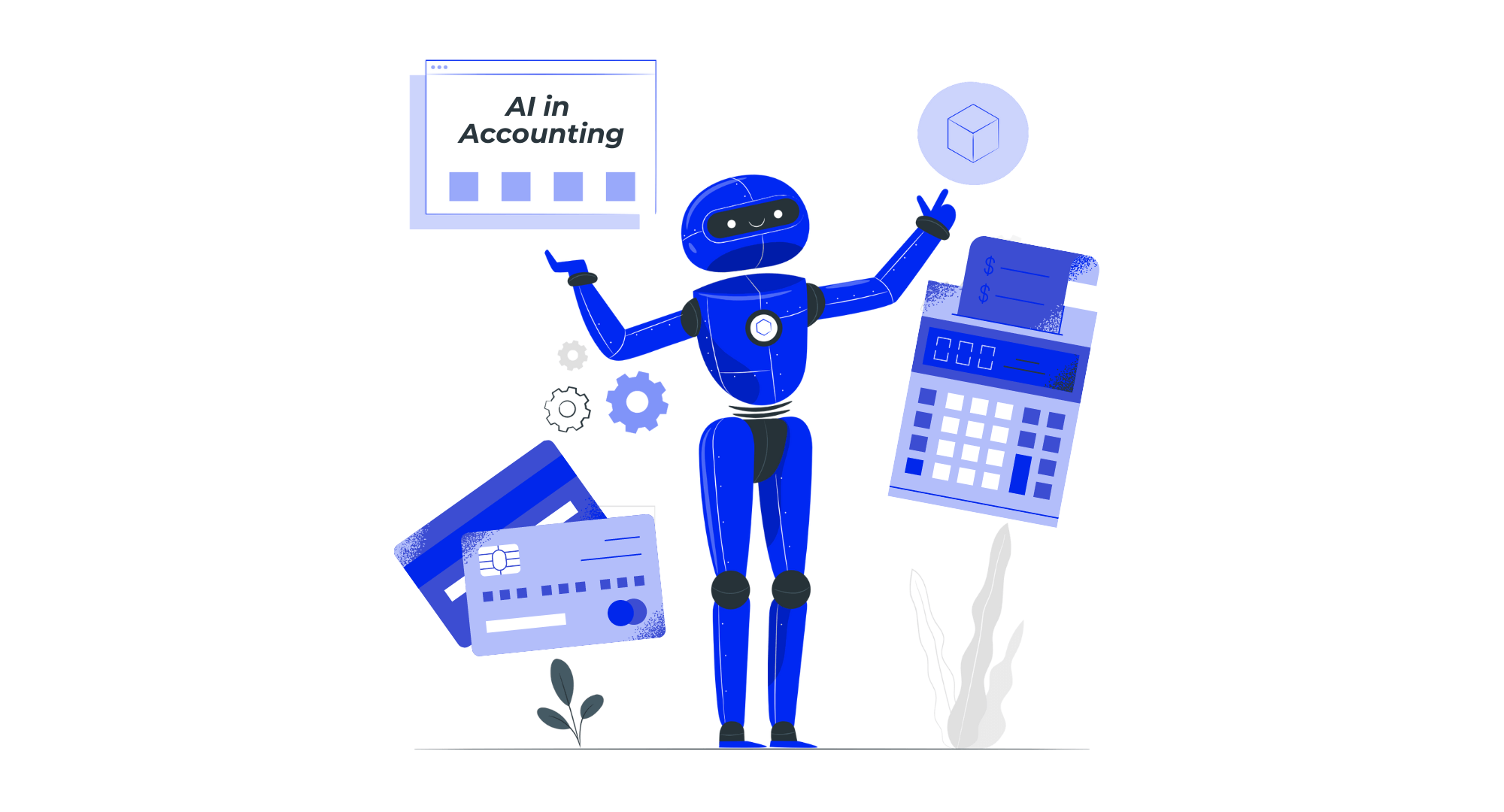
In the dynamic landscape of modern business, artificial intelligence (AI) has emerged as a transformative force disrupting habitual models and redefining multiple processes to match fast-changing business needs and maximize efficiency.
A branch of computer science that focuses on creating intelligent machines capable of mimicking human cognitive functions, AI has become a catalyst for innovation across various industries including cloud accounting.
A cornerstone of business operations, accounting involves the meticulous recording, analysis, and interpretation of financial information. While the core accounting principles remain constant, the tools and techniques for executing these principles have evolved over time. The integration of AI into the accounting field represents the next phase of this evolution.
AI in the Realm of Accounting: Current Applications

Smart tech is about optimization, improvement, and automation. Permeating various industries and business fields, it simplifies complex processes and makes certain tasks easier while allowing companies to save time, effort, and costs. The same is true for bookkeeping and financial processes.
In the accounting sector, intelligent technology enhances efficiency, accuracy, and decision-making capabilities. The blend of advanced algorithms and machine learning reshapes how financial data is processed, analyzed, and interpreted, leading to improved insights and more effective financial management.
AI integration into accounting has already started and brought forth a wave of transformative applications that not only streamline routine tasks but also amplify the analytical capabilities of accountants, contributing to more informed decision-making.
Data Entry and Categorization
In the past, data entry and categorization have been time-consuming and error-prone tasks, often occupying a significant portion of accountants’ workloads. Smart tech’s entry into accounting has revolutionized this landscape.
Advanced AI algorithms can swiftly process vast volumes of financial data, accurately categorizing transactions and minimizing the risk of manual errors. This automation allows accounting professionals to allocate their time and expertise toward more strategic activities.
Invoice Processing
Traditionally a labor-intensive job, AI-powered systems can now extract essential information from invoices, match them with corresponding purchase orders, and update financial records seamlessly. This not only expedites the payment process but also reduces the chances of errors that can arise from manual data entry.
Besides, specialized invoice software will make it easy for businesses to issue payment documents for customers and store their basic financial docs in a digital form for even quicker, faster, and more accurate processing.
Predictive Analytics for Budgeting and Forecasting
Envisaging future financial trends and needs is a cornerstone of effective business planning. Thanks to its strong analytical capabilities, intelligent tech scrutinizes and analyzes historical data to identify patterns and correlations, thus, enabling accurate forecasts for budgeting purposes.
With AI’s ability to process large datasets quickly, organizations can make well-informed decisions and optimize resource allocation based on forecasts that consider a multitude of variables and take into account the nuances and details a human professional could miss.
Auditing and Compliance
AI-powered auditing tools can conduct thorough reviews of financial records to identify discrepancies, errors, and non-compliance with regulations. By employing machine learning algorithms, they screen large datasets and detect anomalies, improving audit quality and reducing the risk of oversight.
As such, these tools significantly speed up the complex auditing process and enhance the accuracy of financial reporting.
Fraud Detection and Prevention
Digitization and fintech greatly simplify and facilitate intricate financial and accounting processes. At the same time, though, they make digital finance more vulnerable and exposed to fraud. This is where smart tech comes to offer a formidable defense.
AI models can check vast volumes of transactions, flagging anomalies and suspicious patterns that might indicate fraudulent activities. By learning from historical fraud instances, smart systems continuously evolve to recognize emerging threats, thereby enhancing an organization’s ability to detect and prevent financial misconduct.
Collaborating with a fintech development company can help businesses implement AI-driven fraud detection systems tailored to their specific needs, ensuring enhanced security and compliance in the ever-evolving financial landscape.
In fintech, machine learning is pivotal for analyzing financial data and optimizing services, enhancing both efficiency and accuracy. This technology is essential in tailoring financial solutions and strengthening cybersecurity in the rapidly evolving digital finance sector.
Additionally, implementing a VPN for PC can provide an extra layer of security for these financial transactions, encrypting data and shielding financial operations from potential cyber threats, thus further fortifying the security measures within fintech environments.
Real-Time Financial Insights
Intelligent technology enables real-time access to financial insights, empowering decision-makers with up-to-the-minute data. This capability is precious in a fast-paced business environment, where swift decisions can be the difference between seizing an opportunity and missing out.
As we expect a Bitcoin halving on April 2024, these AI-enabled dashboards and reporting tools can provide stakeholders with valuable insights at a glance.
Improved Customer Support
Chatbots and virtual assistants can handle routine customer queries related to accounting, taxes, and financial planning. By helping clients find information or generate reports and offering real-time responses, they bring customer experience to a new quality level and save time for both clients and accountants. Partnering with a reputable fintech development company can assist businesses in implementing such advanced AI-driven solutions effectively.
In addition to chatbots and virtual assistants, live chat software also plays a pivotal role in enhancing customer service. By offering real-time, human interaction, live chat can address more complex issues and provide personalized guidance, thereby further elevating the overall customer experience.
Benefits of AI Integration in Accounting
 (Source)
(Source)
As the world of finance continues to evolve, AI serves as a pivotal tool that not only streamlines existing processes but also enables accountants to make better decisions, elevate client interactions, and contribute to the strategic growth of organizations. Integrating AI in accounting offers a host of multifaceted and impactful advantages.
Increased Efficiency and Time Savings
One of the immediate benefits of smart tech integration in accounting is the remarkable increase in efficiency and time savings. AI-powered automation handles routine and time-consuming tasks, such as data entry and processing, at unparalleled speeds and accuracy. It will allow professionals to save up to 80%-90% of time on repetitive jobs.
This liberation of human resources from mundane tasks allows accounting professionals to allocate their expertise toward more strategic and value-added activities. With the rise of artificial intelligence development services, companies are now able to further enhance these strategic activities, leveraging cutting-edge AI to drive innovation and efficiency in financial management. The time saved can be redirected to activities like data analysis, proactive decision-making, and engaging with clients, resulting in a more productive and engaged workforce.
Improved Accuracy and Reduced Human Error
Human errors in bookkeeping can have severe consequences, leading to financial discrepancies, compliance issues, and reputational damage. AI’s inherent precision and ability to process data consistently reduce the risk of manual errors.
By automating data entry and verification processes, intelligent tech minimizes the chances of transcription errors, ensuring data integrity throughout financial records. This heightened accuracy not only boosts confidence in financial reporting but also contributes to better decision-making based on reliable data. Thus, according to a Deloitte report, over 79% of CFOs expect their companies to adopt AI automation in their operations in 2023.
Enhanced Data Security and Privacy
In an era marked by increasing cyber threats and data breaches, smart technology integration enhances data security and privacy in accounting practices. AI systems are equipped with robust encryption mechanisms and advanced security protocols that safeguard sensitive financial information.
These systems can detect irregularities or unauthorized access attempts swiftly, allowing for rapid intervention and minimizing potential breaches. Moreover, AI’s ability to trace and audit data access trails adds an additional layer of security, ensuring compliance with data protection regulations.
Scalability of Accounting Operations
As organizations grow and evolve, their accounting needs expand. While fundamental accounting principles stay the same, manual processes might struggle to keep up with this growth. AI integration addresses this challenge by enabling scalable operations.
Smart systems can handle increased data volumes without proportional increases in human resources. This scalability is particularly valuable during peak periods, such as tax seasons or financial reporting deadlines. Organizations can seamlessly accommodate growth without compromising on the accuracy and quality of their financial operations.
If you look back at the Big Four accounting companies such as Deloitte, KPMG, Ernst & Young, and PwC, they consistently invest in AI solutions to stay on top of their operations and always have some leeway for handling growing workloads.
Challenges of Implementing AI in Accounting
 (Source)
(Source)
With numerous benefits to it, AI implementation in bookkeeping also presents a range of challenges that organizations must navigate. These challenges underscore the need for thoughtful planning and strategic management throughout the implementation process.
- Data Quality: Poor input data quality, including errors, inconsistencies, and incomplete information, can lead to inaccurate outcomes. Addressing data quality issues calls for validation procedures to ensure that AI algorithms produce reliable results.
- Data Compatibility: Organizations often possess diverse data sources originating from various systems and formats. Data integration challenges can arise due to differences in terminology, structure, or units of measurement. Compatibility issues can hinder the effectiveness of smart solutions and require careful data engineering to overcome.
- Ethical Concerns: The use of AI in accounting raises ethical considerations, especially regarding data privacy, security, and transparency. Handling sensitive financial data responsibly and ensuring compliance with regulations like GDPR is paramount.
- Algorithmic Bias: AI algorithms can inadvertently perpetuate biases present in historical data. In accounting, biased algorithms might lead to skewed insights, impacting financial decisions. Addressing algorithmic bias requires ongoing monitoring and re-evaluation of training data.
- Workforce Transition: The introduction of AI can evoke concerns about job displacement. Routine tasks that were previously performed by human accountants might be automated, leading to changes in job roles. Organizations need to manage this transition by upskilling their workforce to handle more complex tasks that require human judgment, critical thinking, and strategic insight.
- Initial Investment: Implementing smart tech in accounting involves upfront costs, including technology acquisition, software development, and training. Organizations need to carefully assess these costs against the expected benefits to ensure a favorable return on investment (ROI).
- Implementation Challenges: Introducing intelligent systems into existing accounting processes can be complex. Ensuring seamless integration with legacy systems, overcoming resistance to change, and addressing potential disruptions during the employment phase require meticulous planning and stakeholder engagement.
One of the trends shows that entrepreneurs are adopting AI tools to streamline and expand their operational workflows. Using advanced AI capabilities, these business leaders focus on automating everyday tasks, extracting actionable insights from complex data sets, and improving strategic decision-making processes, increasing organizational efficiency and increasing profitability.
Employing AI in Accounting: Steps to Take
While it’s clear that AI implementation in accounting holds immense potential to revolutionize how financial processes are conducted, successful integration requires careful planning, strategic decision-making, and thorough execution. As such, it involves a structured approach that encompasses a few key steps.
In addition to the existing array of tools, integrating a custom AI tool into accounting operations can significantly streamline data processing and financial analysis without the need for complex coding. This modern approach allows firms to leverage bespoke solutions tailored to their specific needs, enhancing productivity and decision-making accuracy.
1. Data Preparation and Integration
- Data cleaning and normalization: Before AI systems can provide accurate insights, input info needs to be prepped for analysis. This involves data cleaning to remove inconsistencies, errors, and duplicates. Additionally, data normalization ensures that different data sources are standardized and compatible, allowing smart algorithms to work in synergy.
- Integration with existing accounting systems: Intelligent systems should seamlessly incorporate with the organization’s existing accounting software and frameworks. It’s a must for a smooth flow of data between various tools, preventing data silos and enabling a holistic view of financial information. A well-executed integration minimizes disruptions to ongoing operations and maximizes the benefits of AI.
2. Choosing the Right Technologies
- Machine Learning models for data analysis: Selecting appropriate ML models is pivotal for effective data analysis. For instance, clustering algorithms can identify patterns within large datasets, while regression models can predict future financial trends. The choice of model depends on the specific analytical goals, and it’s crucial to have experts who understand both the accounting domain and AI technology.
- Robotic Process Automation (RPA): RPA involves creating software robots that mimic human actions to perform repetitive tasks. In accounting, RPA can automate routine activities such as data entry, invoice processing, and report generation. Integrating RPA requires identifying processes suitable for automation, developing the necessary scripts, and ensuring the robots work in tandem with existing systems. Moreover, as digital currencies gain popularity, understanding how to buy Bitcoin in Australia becomes increasingly relevant for individuals and businesses looking to diversify their investments. Many cryptocurrency buying platforms use RPA to provide more accurate data and predictions.
3. Training and Customization of AI Tools
- Once AI technologies are selected, system training is imperative to ensure reliability and efficiency. ML models, for instance, require training on historical data to learn patterns and correlations.
- Customization involves tailoring smart tools to the organization’s unique requirements. This might involve adjusting algorithms, configuring thresholds for fraud detection, or fine-tuning parameters for data analysis.
4. Monitoring and Continuous Improvement
- Notably, the implementation process doesn’t end once AI systems are up and running. Regular monitoring is essential to ensure that intelligent tools and models deliver accurate results and make sound decisions. Any discrepancies or anomalies must be promptly addressed to maintain data integrity.
- More than that, smart systems should be subject to continuous improvement. As the organization’s data evolves and the tech learns from new patterns, adjustments should be made to optimize performance and maintain relevance.
Future AI Trends and Opportunities in Accounting
Though smart tech has already permeated accounting, it’s not at its peak yet. Looking ahead, there are several exciting trends set to shape the landscape of bookkeeping practices and redefine how financial data is managed and analyzed.
Further AI Tech Evolution
As AI continues to advance, its capabilities in data analysis, automation, and decision-making will become more refined and sophisticated. ML algorithms will evolve to handle increasingly complex financial scenarios, enabling accountants to glean deeper insights from data. Natural language processing (NLP) will facilitate more intuitive interactions between humans and AI systems, making financial reporting and analysis more accessible.
Moreover, AI’s integration with other emerging technologies like quantum computing and edge computing holds the potential to increase the speed and scale at which financial data is processed. As smart technologies mature, their applications will expand beyond routine tasks to tackle more intricate financial modeling, scenario analysis, and predictive analytics with unparalleled accuracy.
Integration of AI with Blockchain
The decentralized and immutable nature of blockchain enhances the security, transparency, and traceability of financial transactions. AI’s ability to analyze bulks of data can complement blockchain’s capabilities by quickly identifying anomalies, fraud attempts, and discrepancies in real time. This fusion could maximize auditing processes, making them more efficient and tamper-proof.
On top of that, smart algorithms can assist in verifying transactions on blockchains, ensuring accuracy and minimizing errors. This integration could also pave the way for the development of smart contracts that are not only self-executing but also self-verifying through AI-driven audits, reducing the need for external oversight.
AI Impact onAdaptive and Dynamic Financial Reporting
Traditional static financial reports will evolve into dynamic dashboards that provide ongoing insights into a company’s financial health. Intelligent algorithms will process data as it’s generated, enabling organizations to respond swiftly to changing market conditions and make informed decisions.
Adaptive financial reporting will involve smart systems analyzing a multitude of variables and their interplay to predict potential financial outcomes. It will empower organizations to anticipate challenges and opportunities, optimizing risk management. Additionally, AI’s ability to simulate different scenarios will enable businesses to explore “what-if” scenarios and make strategic decisions based on comprehensive analyses based on such factors as sales, costs, market conditions, etc.
Conclusion
The integration of artificial intelligence into accounting practices has brought about a paradigm shift, transforming traditional processes and opening up new avenues for innovation. Organizations harnessing the power of smart tech in their financial operations will gain a competitive advantage and stay on top of their development opportunities.
In the meantime, this integration journey is not just about technological advancement; it’s about redefining the existing boundaries and reshaping the way financial information is processed, analyzed, and utilized. The canvas of the accounting future is certainly painted with AI’s brush, forging a path of transformation and excellence.
Unlock the Potential of Accounting with Billdu!
Give Billdu accounting a try to experience its effectiveness in managing your financial tasks. Make an informed choice by selecting from the best accounting software solutions available in Australia.










